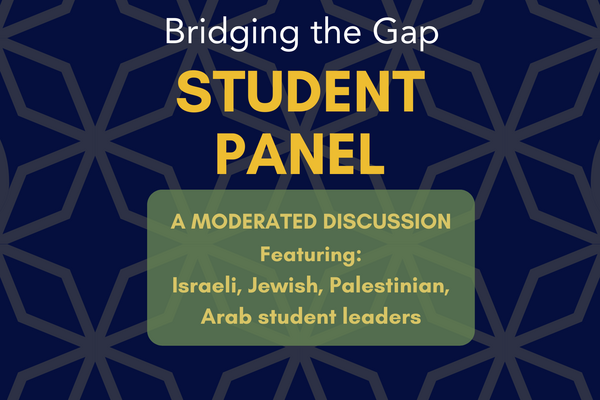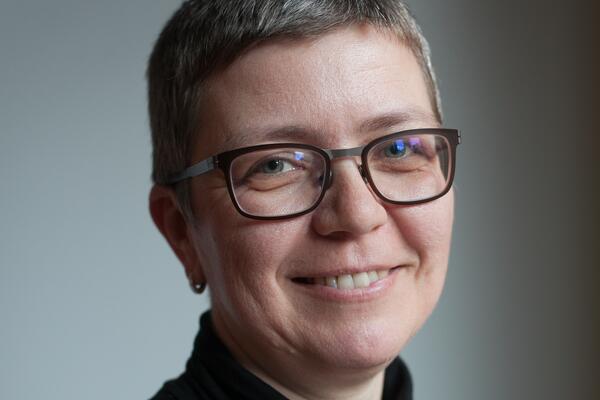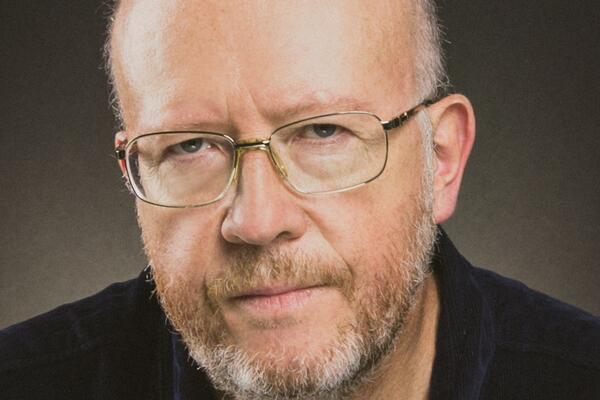Along with various research partners at Queen's University, the Centre hosts an annual Speaker Series featuring an array of scholars of democracy and diversity from around the globe. Some seasons are thematically organized, while others are a general collection. Upcoming Speaker Series events will be listed here as well as past events. We look forward to you joining us again soon!
Past Events
Feb
10
Monday

Oct
01
Tuesday

CSDD Research Fellows Present: "What do we mean by 'systemic racism' in Canada? [A work-in-progress talk]" - with Debra Thompson
Debra Thompson, McGill University
Apr
11
Thursday

"Bridging the Gap: Israel-Palestine Student Discussion" - A Moderated Panel Discussion
A public student panel discussion about Israel/Palestine
Mar
11
Monday

CSDD Research Fellows Present: "Lip Service or Recommitment? An Analysis of Three Forms of Tribal Consultation" - with Dani Delaney
Danielle Delaney, Queen's Department of Political Studies
Feb
26
Monday
CSDD Research Fellows Present: "Coalitions, Conflicts, and the Space in Between: Political Relations Between Asians, Blacks, and Latinos in the U.S." - with Fan Lu
Fan Lu, Queen's Department of Political Studies
Speaker Series Archive
Ethnicity and Democratic Governance Series
Ethnicity and Democratic Governance - Making Distinctions and Making Connections *
Bruce Berman, Director and Principal Investigator of the EDG program
Department of Political Studies, Queen's University
March 31, 2011
This talk is co-sponsored by the Department of Political Studies
A Restricted View of Apologies for Historical Injustices *
Jeff Spinner-Halev, Kenan Eminent Professor of Political Ethics, Dept of Political Science, University of North Carolina, Chapel Hill
March 3, 2011
Cultural Rights and Women's Rights in Ethiopia *
Dr. Lahra Smith, Visiting Fulbright Research Chair in Ethnicity and Multicultural Citizenship
November 15, 2010
Peace-making and Constitution Building in Divided Societies
Nicholas Haysom, Director for Political Affairs, Executive Office of the Secretary-General of the UN
October 28, 2010
Ethnicity and Identity in the Constitutional Process: Kenya in Comparative Perspective
Yash Ghai, Professor Emeritus of Constitutional Law, University of Hong Kong
Monday, September 27, 2010
This talk is co-sponsored by the Department of Political Studies
Yash Ghai was the Sir Y.K. Pao Professor of Public Law at the University of Hong Kong, and has been a Professor Emeritus of Constitutional Law there since his retirement. He is the principal UN expert on constitutional design and was chair of the Constitutional Reform Commission in Kenya in 2002-05. Ghai has also worked on constitutions in Bosnia, Iraq, Fiji and Nepal.
* Talk can be downloaded through iTunesU.
Models of Religious Governance
Veit Bader,University of Amsterdam
March 10, 2010
Towards a Theory of Territory
Margaret Moore, Queen's University
February 3, 2010
"The Significance of Decommissioning in the Northern Ireland Peace Process"
General John de Chastelain
Tuesday April 21, 2009
General John de Chastelain has numerous awards and titles, including Officer of the Order of Canada, Companion of Honour (UK), and Commander of the Legion of Merit (USA). He has served as Deputy Chief of Staff of the UN Force in Cyprus and as Commander of the Canadian Contingent, and was promoted as General in 1989 and appointed Chief of the Defence Staff, a position he held during the Cold War’s end, the First Gulf War, and the events at OKA. In January 1993 he transferred to the Supplementary Reserve and was appointed Canada’s eighteenth Ambassador to the United States of America. Since November 1995 he has been involved in Belfast and Dublin with international bodies working on the Northern Ireland peace process, including chairing the negotiations that led to the Belfast Agreement of April 1998. Currently de Chastelain is Chairman of the Independent International Commission on Decommissioning.
This talk is co-sponsored by Queen’s Centre for International Relations.
Inheritance and Indigenous Rights
Burke Hendrix, Cornell University
Thursday March 12, 2009
Burke Hendrix is Assistant Professor at Cornell University, jointly appointed to the Department of Government and the Program on Ethics & Public Life. During the current academic year, he is a Visiting Faculty Fellow at the University of Toronto’s Centre for Ethics. Professor Hendrix works on a variety of moral issues surrounding political authority, property ownership, historical injustice, and political strategy as they apply to Aboriginal peoples in Canada, the United States, and elsewhere. He is the author of Ownership, Authority, and Self-Determination (Penn State University Press, 2008).
Co-governance and Temporality: Ethical Encounters in the Canadian North
Louis Howe, University of West Georgia
Thursday February 12, 2009
Louis Howe, Fulbright Visiting Research Chair in Ethnicity and Multicultural Citizenship, is a visiting political theorist from the University of West Georgia whose work pursues issues of governmentality and ontology in public administration. Currently he is exploring recent developments in Canadian and U. S Indigenous administration and law with a view to how administrative and judicial sensibilities might be sharpened such that public administration could facilitate rather than thwart agonistic ethical engagements between heterogeneous constituencies and foster democratic processes of self-determination and identity construction.
Learning from feminist peace activism: Lessons for conflict resolution and peace building in Israel/Palestine and Northern Ireland
Siobhan Byrne, University College Dublin
Thursday January 8, 2009
Siobhan Byrne is post-doctoral scholar in the Global Irish Institute, University College Dublin. She will be completing her doctoral dissertation in the Department of Political Studies, Queen's University this winter. Siobhan completed ten months of fieldwork related to her thesis in 2005 as a Rabin Scholar at the Gilo Center for Citizenship, Democracy and Civic Education, Hebrew University, Jerusalem. In 2005-06, she completed four months of fieldwork at the University College Dublin and Queen's University, Belfast. Her primary area of research is feminist peace activism and peace building in societies in transition from conflict. Siobhan will be joining the faculty in the Department of Political Science, University of Alberta in the fall 2009.
Ethnicity, Elections and the Kenya Situation
Chweya Ludeki, permanent secretary in the office of the vice-president of Kenya
Friday November 21, 2008
Dr. Chweya Ludeki (Ph.D. Queen’s 2003), former head of the politics department at the University of Nairobi, is the permanent secretary for the office of the vice-president and the ministry of home affairs in Kenya. He will discuss ethnic issues in the contested Kenyan election of December 2007 and the violence that followed in January and February.
Creating European Citizens
Willem Maas, York University
Friday November 14, 2008
Dr. Willem Maas (PhD Yale 2004) holds the Jean Monnet Chair in European Integration at York University and is Associate Professor of Political Science and Public & International Affairs at York's Glendon College. Maas is the author of Creating European Citizens (Lanham: Rowman & Littlefield, 2007); "Migrants, States, and EU Citizenship's Unfulfilled Promise," Citizenship Studies, vol 12 no 6 (December 2008); "Unrespected, Unequal, Hollow?: Contingent Citizenship and Reversible Rights," Columbia Journal of European Law, vol 15 no 2 (spring 2009); and "Citizenship and Immigrant Integration in the Netherlands" (under consideration). He is currently researching the comparative politics of citizenship and nationality laws.
Learning to be Quiet: A proposal for European Union Conflict Prevention *
Michael Johns, Laurentian University
January 25, 2008
Dr. Michael Johns is an Assistant Professor of Political Science at Laurentian University - Barrie Campus. He holds a Master's degree in Comparative Politics from the London School of Economics and a Ph.D. from the University of Maryland - College Park. Prior to coming to Laurentian, Dr. Johns was the Researcher in Residence for the Organization for Security and Co-operation in Europe's High Commissioner on National Minorities in The Hague, Netherlands. He currently is an Executive Member for the Centre for Research on Canadian-Russian Relations and has recently been elected to the Advisory Board of the Minorities at Risk Project.
How do 'We' Become 'Multicultural'? The Social Constitution of Pluralist Group Identity
Elke Winter, University of Ottawa
November 22, 2007
Dr. Elke Winter holds an International Council for Canadian Studies postdoctoral fellowship at EDG and is working with Will Kymlicka during the fall term. She studied sociology in Germany, Spain and Canada (Ph.D., York University, 2005). She recently accepted a position as Assistant Professor in the Department of Sociology and Anthropology at the University of Ottawa. Dr. Winter is the author of Max Weber et les relations ethniques (Laval University Press, 2004). In this book, she traces Weber's intellectual trajectory from his early confrontation with dominant biological/racial conceptions of the social to his reluctant embracement of the multi-national state.
Currently, she is completing a book manuscript on the social constitution of normative pluralism. Concentrating on discourses in the mainstream press, she examines the integration of (previously constructed) ethnic categories ("them") into a Canadian "multicultural we" through contrast with "others". Particular attention is given to representations of minority nationalism within (de)legitimizations of multiculturalism. Dr. Winter has published articles in Ethnicities, International Journal for Canadian Studies and Nations and Nationalism.
Managing Diversity: The Relevance of Canadian Experience for Foreign Affairs
John Packer, University of Essex
September 20, 2007
As of October 1st, John Packer will be Professor of Law and Director of the Human Rights Centre, University of Essex. He was formerly Senior Legal Adviser and then Director of the Office of the OSCE High Commissioner on National Minorities and, before that, a Human Rights Officer at the UN where he investigated serious HR violations in Iraq, Burma, and Afghanistan. He has been a fellow at the Carr Centre of HR Policy at Harvard's Kennedy School and a Visiting Assistant Professor of International Law at the Fletcher School of Law & Diplomacy at Tufts University. In the last few years he has been coordinator of the Global Initiative on Conflict Prevention through Quiet Diplomacy. He has advised (and still does) a number of governments, IGOs and NGOs around the world on peace and security, human rights, diversity management, conflict prevention and resolution, and dialogue and mediation.
National Identity and Inclusion: The moral force of transformative prescriptions
Catherine Frost, McMaster University
March 15, 2007
Catherine Frost is an Assistant Professor in the Department of Political Science at McMaster University. Her research interests include nationalism, diversity issues, and contemporary theory. Her research work centres on questions of representation and justice. Current research projects include looking at the relationship of nationalism and diversity, and also new media technologies and how these may be re-shaping social and political relations. Recent publications include: ?Is post-nationalism or liberal-culturalism behind the transformation of Irish nationalism?? (Irish Political Studies 2006, Vol. 21, No. 3), and Morality and Nationalism (London: Routledge, 2006).
Luck, Institutions, and Global Justice
Kok-Chor Tan, University of Pennsylvania
March 8, 2007
The doctrine known as luck egalitarianism provides a relatively straightforward case for global distributive equality. On the luck egalitarianism view, the guiding aim of an egalitarian distributive principle is to mitigate or discount the influence of luck on persons? life prospects. Accordingly, if people?s citizenship or the natural distribution of the earth?s wealth and resources is generally a matter of luck for which persons cannot generally be held responsible but which nonetheless affects profoundly and pervasively their life options, then there ought to be some global distributive commitments to counter the effects of such contingencies on people?s life chances (e.g. Beitz 1979; Pogge 1989). Yet, luck egalitarianism has come under heavy criticisms in the recent literature, and is very much on the defensive if not retreat. Indeed, some opponents of global egalitarianism proceed by exposing and undermining the luck egalitarian presumptions behind the common arguments for global distributive justice (see Freeman 2004; Heath 2007). A successful defense of global egalitarianism on luck egalitarian grounds must, therefore, first show how and why the luck egalitarian ideal is a plausible and attractive one, these recent objections against it notwithstanding. My goal in this paper is to outline a plausible understanding of the luck egalitarian position, and then suggest how this account of luck egalitarianism can ground the case for global distributive equality.This talk is co-sponsored by the Philosophy Department.
* Talk can be downloaded through iTunesU.
Management of Diversity in Russia: symbolic or instrumental policies?
Alexander Osipov
November 29, 2006
Alexander Osipov defended his Ph.D. thesis in ethnology in the Institute of Ethnology and Anthropology (Russian Academy of Sciences) in 1993. He worked in at the Russian Academy of Sciences from 1989 to 2003. He is a research fellow of the Centre for Independent Social Research (Saint-Petersburg, Russia) and a programme co-ordinator with the Human Rights Centre ‘Memorial’, one of the leading Russian non-governmental human rights organizations. Osipov’s research activities primarily focus on ethnicity, minority protection and racial discrimination. Recent publications include: National-Cultural Autonomy: Ideas, Decisions, Institutions (Saint-Petersburg: TsNSI, 2005) (in Russian); (with Vladimir Malakhov) “The category of minorities in the Russian Federation: a reflection on uses and misuses” in International Obligations and National Debates: Minorities around the Baltic Sea (Editor-in-Chief: Sia Spiliopoulou Åkermark. Mariehamn: Åland Islands Peace Institute, 2006).
“Liberal Multiculturalism and Cultural Diversity in Cambodia"
Stefan Ehrentraut, University of Potsdam
November 23, 2006
Stefan Ehrentraut's research interests include theories of multiculturalism and their application in Asian countries. Stefan has worked for the International Labour Organization's PRO 169 project in Geneva and Cambodia and for the German Technical Cooperation in Ethiopia and Cambodia. He is currently a Ph.D. student at the University of Potsdam in Germany and a visiting student at Queen's Forum for Philosophy and Public Policy.
Ethnicity and Conflicts in the South Caucasus
Pierre Jolicoeur, Queen’s University
November 9, 2006
Pierre Jolicoeur, recipient of two grants (Fonds québécois de recherche sur la société et la culture and Department of National Defence, Security and Defence Forum program), is a postdoctoral fellow at Queen’s University. He completed his Ph.D. at UQAM in 2006 with a dissertation entitled “Autonomy and Secessionist Conflicts in the South Caucasus between 1988 and 2005”. His main areas of research are security issues in the post-Soviet Union, Russian foreign policy, and federalism in the context of conflict resolution. Publications include (with Yann Breault and Jacques Lévesque) La Russie et son ex-empire: reconfiguration géopolitique de l’ancien espace soviétique (Paris: Presses de Sciences Po, 2003). From 2000 to 2006, he edited the “Points de mire” series, published by the Centre d’études des politiques étrangères et de sécurité (CEPES) at UQAM.
Lessons learned (or not learned) from the Rwandan Genocide of 1994
Major Brent Beardsley, Royal Military College
October 26, 2006
Major Brent Beardsley has served for 26 years as an Infantry Officer in the Royal Canadian Regiment. In 1993-1994, he served as General Dallaire’s personal staff officer in UNAMIR, before and during the genocide in Rwanda. He is the co-author of General Dallaire’s Shake Hands with the Devil: The Failure of Humanity in Rwanda (Toronto: Random House Canada, 2003), which won the Shaughnessy Cohen Award for Political writing in 2003 and the Governor General's Award for non-fiction in 2004. He is currently employed as a research officer at the Canadian Forces Leadership Institute of the Canadian Defense Academy at the Royal Military College.
Immigration Policies and Pacific Rim Diversity: Historical Lessons, Contemporary Practices, and the Impact on Asians
Wei Li, Arizona State University
Thursday October 12, 2006
Wei Li is an Associate Professor in the Asian Pacific American Studies Program and is this year’s Fulbright Visiting Chair in Ethnicity and Multicultural Citizenship at Queen’s University. Recent publications include “Financial globalization and cross-border comovements of money and population: foreign bank offices in Los Angeles”, Environment and Planning A (with Gary Dymski, 2004, Vol. 36, No. 2), an edited collection titled From Urban Enclave to Ethnic Suburb: New Asian Communities in Pacific Rim Countries and a monograph, Ethnoburb: The New Ethnic Community in Urban America (forthcoming, University of Hawaii Press).
The Characterisation of Timor-Leste's Independence: Was it a Secession?
Peter Radan, Macquarie University, Australia
September 25, 2006
Peter Radan is an Associate Professor and Head of the Department of Law at Macquarie University, Australia. His research interests include self-determination, secession, law and religion, laws of war, and contracts and equity. Recent publications include Law and Religion: God, the State and the Common Law (co-edited with D. Meyerson & R. Croucher. London: Routledge, 2005) and Equity & Trusts (with C. Stewart and A. Lynch, 2nd ed. Sydney: LexisNexis, 2005). He is currently conducting research (with Associate Professor Aleksandar Pavkovic) on the normative assessment and legal regulation of secession.
RGoNEMC Series
The Political Culture of Respect: Implications for a Redefined Islam
Rima Berns-McGown
March 29, 2006
Rima Berns-McGown's research interests include the interrelationships between culture, religion, politics, and political culture as it concerns the integration of immigrants and minorities. She is the author of Muslims in the Diaspora: The Somali Communities of London and Toronto (Toronto: University of Toronto Press, 1999).
Divergent approaches to ethnic party politics in East and West: "Radicals" as a litmus test for liberal democracy
Christian Leuprecht, Queen's University and Royal Military College
March 10, 2006
Christian Leuprecht is a founding research fellow at the Centre for Security, Armed Forces, and Society at RMC, a Research Associate at the Institute for Intergovernmental Relations in the School of Policy Studies, and a Fellow at the Centre for International Relations at Queen's. His recent works include "Challenge and Change: Gender and Diversity in the Military" in Gender & Diversity (Editor: Franklin C. Pinch. Kingston: Canadian Forces Leadership Institute, 2005), and ?Ethnic demographics: Canada's Force Multiplier? in Choice of Force: Special Operations for Canada (Editors: David Last and Bernd Horn. Montreal & Kingston: McGill-Queen's University Press, 2005).
Multiculturalism, Immigration, and Justice
Joseph H. Carens, University of Toronto
February 16, 2006
Joseph H. Carens's research interests include contemporary political theory, immigration, multiculturalism, and citizenship. His current research focuses on the ethics of immigration. He is the author of "Who Should Get In" The Ethics of Immigration Admissions," Ethics and International Affairs, Vol 17, No. 1 (Spring 2003), and Culture, Citizenship, and Community : A Contextual Exploration of Justice As Evenhandedness (New York: Oxford University Press, 2000).
Whose Multiculturalism?
Cynthia Levine-Rasky, Queen's University
January 27, 2006
Cynthia Levine-Rasky is cross-appointed with the Department of Sociology and the Faculty of Education. Her research interests intersect the areas of race, inequality, and education. Her current publications include the edited volume Working through Whiteness: International Perspectives (Albany: SUNY Press, 2002) in which she has an essay titled "Critical/relational/contextual: Toward a model for studying whiteness", and Inequality in Canada: Intersections of Gender, Race, and Class (edited with Valerie Zawilski. Toronto: Oxford University Press, 2004). Her current projects focus on the intersections between white racialization and the social relations of power.
Maîtres Chez Nous: The Role of Homelands in Ethnic Conflict
Walker Connor, Middlebury College
October 14, 2005
Walker Connor is scholar-in-residence in the Department of Political Science at Middlebury College. He is the first Fulbright Chair in Nationalism and Ethnicity at Queen's and is one of the world's leading authorities on nationalism. He is the author, among other things, of The National Question in Marxist-Leninist Theory and Strategy (Princeton: Princeton University Press, 1984) and Ethnonationalism: The Quest for Understanding (Princeton: Princeton University Press, 1994, 1996).
Jewish Settler Activism in the West Bank: Institutional Foundations
Oded Haklai, Queen's University
September 23, 2005
Oded Haklai is an Associate Professor in the Department of Political Studies and a member with the Centre for the Study of Democracy and Diversity.
Genocide, Democracy and Minority Rights: The Puzzle of Rwanda and Burundi
Villia Jefremovas, Queen's University
March 2, 2005
Universal Justice, Local Norms: The (Sometimes) Pseudo-Debate of Human Rights Violations Within Minority Cultures
Nahshon Perez, Hebrew University of Jerusalem
November 24, 2004
Census Categorization and Ethnic Politics: The Russian Census in Comparative Perspective
Dominique Arel, University of Ottawa
November 10, 2004
European Integration and the Nationalities Question
Michael Keating, European University Institute
November 1, 2004
Ethnicity and Nationalism: North America's Francophones in Comparative Perspective
Jean Tournon, Université Pierre-Mendès France, Grenoble
October 4, 2004
Peacebuilding and Democratization
Jane Boulden, Royal Military College
September 29, 2004
"War as Part of the Peace Process: Israeli and Palestinian 'Iron Walls'" (2004 Sheila Skelton Menzies Lecture)
Ian Lustick, University of Pennsylvania
Wednesday, March 10, 2004
"Democratization and Nation-Building in South East Europe"
Dejan Guzina, Wilfrid Laurier University
Friday, February 27, 2004
"The Distinctiveness of Indian Secularism"
Rajeev Bhargava, University of Delhi
Monday, February 9, 2004
"Sword and Pen: Drawing Warriors' Teeth or Strengthening Their Arms?"
Lt. Col. David Last, Royal Military College of Canada
Friday, January 23, 2004
"Nationalist Strategies and European Integration"
Zsusza Csergo, George Washington University
Thursday, December 11, 2003
"Hinduism, Christianity and Liberal Religious Toleration"
Jeff Spinner-Halev, Hebrew University of Jerusalem
Friday, November 28, 2003
"Why Identity is a Danger in Democracy"
Daniel Weinstock, Université de Montréal
Friday, November 14, 2003
"The Challenge of Federalism in Multinational Polities: The Nigerian Experience"
John Boye Ejobowah, Wilfrid Laurier University
Friday, October 24, 2003
"Official Language Rights and the Problem of Inclusion/Exclusion"
Alan Patten, McGill University
Friday, September 26, 2003





